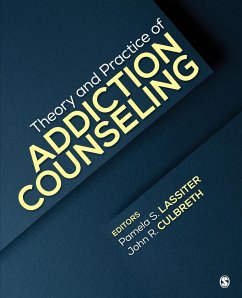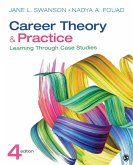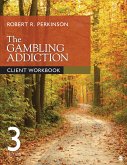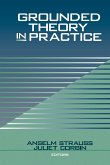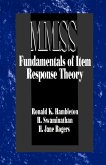- Broschiertes Buch
- Merkliste
- Auf die Merkliste
- Bewerten Bewerten
- Teilen
- Produkt teilen
- Produkterinnerung
- Produkterinnerung
Theory and Practice of Addiction Counseling brings together contemporary theories of addiction and helps readers connect those theories to practice using a common multicultural case study.
Andere Kunden interessierten sich auch für
![Career Theory and Practice Career Theory and Practice]() Jane L. SwansonCareer Theory and Practice165,99 €
Jane L. SwansonCareer Theory and Practice165,99 €![The Gambling Addiction Client Workbook The Gambling Addiction Client Workbook]() Robert R. PerkinsonThe Gambling Addiction Client Workbook83,99 €
Robert R. PerkinsonThe Gambling Addiction Client Workbook83,99 €![Hatching Results for Secondary School Counseling Hatching Results for Secondary School Counseling]() Trish Hatch (CEO and Hatching Results PresidentHatching Results for Secondary School Counseling33,99 €
Trish Hatch (CEO and Hatching Results PresidentHatching Results for Secondary School Counseling33,99 €![Brief Counseling That Works Brief Counseling That Works]() Gerald B. SklareBrief Counseling That Works43,99 €
Gerald B. SklareBrief Counseling That Works43,99 €![Grounded Theory in Practice Grounded Theory in Practice]() Anselm StraussGrounded Theory in Practice165,99 €
Anselm StraussGrounded Theory in Practice165,99 €![Fundamentals of Item Response Theory Fundamentals of Item Response Theory]() Ronald K. HambletonFundamentals of Item Response Theory106,99 €
Ronald K. HambletonFundamentals of Item Response Theory106,99 €![PLC+ PLC+]() Douglas FisherPLC+43,99 €
Douglas FisherPLC+43,99 €-
-
-
Theory and Practice of Addiction Counseling brings together contemporary theories of addiction and helps readers connect those theories to practice using a common multicultural case study.
Hinweis: Dieser Artikel kann nur an eine deutsche Lieferadresse ausgeliefert werden.
Hinweis: Dieser Artikel kann nur an eine deutsche Lieferadresse ausgeliefert werden.
Produktdetails
- Produktdetails
- Verlag: SAGE Publications Inc
- Seitenzahl: 424
- Erscheinungstermin: 8. März 2017
- Englisch
- Abmessung: 235mm x 191mm x 23mm
- Gewicht: 758g
- ISBN-13: 9781506317335
- ISBN-10: 1506317332
- Artikelnr.: 45747469
- Herstellerkennzeichnung
- Libri GmbH
- Europaallee 1
- 36244 Bad Hersfeld
- gpsr@libri.de
- Verlag: SAGE Publications Inc
- Seitenzahl: 424
- Erscheinungstermin: 8. März 2017
- Englisch
- Abmessung: 235mm x 191mm x 23mm
- Gewicht: 758g
- ISBN-13: 9781506317335
- ISBN-10: 1506317332
- Artikelnr.: 45747469
- Herstellerkennzeichnung
- Libri GmbH
- Europaallee 1
- 36244 Bad Hersfeld
- gpsr@libri.de
Pamela S. Lassiter, PhD, is an Associate Professor of Counseling in the Department of Counseling at the University of North Carolina at Charlotte. She has over thirty years of work experience in substance abuse treatment and community mental health. Dr. Lassiter holds credentials as a Licensed Professional Counselor, a Licensed Marriage & Family Therapist, and as a Licensed Clinical Addiction Specialist. She serves as Director of the Addictions Program at UNC Charlotte and teaches graduate courses in addiction and mental health counseling. She is also a past President and of IAAOC and currently the Associate Editor of the Journal of Addiction and Offender Counseling. Trevor J. Buser, Phd, is an Associate Professor at Rider University, where he teaches coursework in both the clinical mental health counseling and school counseling tracks. His research centers on cognitive predictors of non-suicidal self-injury. He also brings a dedicated focus on addictions counseling and is editor of the Journal of Addictions and Offender Counseling. Dr. Buser is a licensed professional counselor, certified school counselor, and approved clinical supervisor. He has professional experience as a college counselor and private practice counselor. He also served as President of IAAOC.
From Treatment Lore to Theory Application: An Introduction to Addiction
Theory and Practice - John R. Culbreth, Pamela S. Lassiter
Treatment Lore
Overview of Book Sections and Chapters
Addiction Counseling Case Study
Appendix A
Historical Perspectives and the Moral Model - Pamela S. Lassiter, Michael
S. Spivey
Colonial Era (1492 - 1763)
American Revolution & Young Republic (1763 - 1820s)
Temperance Movement (1826 - 1919)
Prohibition (1919 - 1933)
World War II Era (1939 - 1945)
Nixon Era (1969 - 1974)
Carter Era (1977 - 1981)
Reagan Era (1981 - 1989)
The 1990s and 2000s
Cultural Views of Addiction
Basic Tenets of the Moral Model
Strengths and Weaknesses of the Theory
Influences on Social Policy
Influences on Clinicians
Case Study Responses
Summary
Biological Theory-Genetics and Brain Chemistry - Kathleen Brown-Rice,
Regina Moro
Overview of Empirical Research Findings on the Addictive Process
Basic Tenets of the Theory
Philosophical Underpinnings and Key Concepts of the Theory
Addictive Substances
How the Theoretical Approach is Utilized by Practitioners
Assessment and Prevention Implications
Strengths and Weaknesses of the Theory
Case Study Response
Summary
Appendix
Psychoanalytic Theory of Addiction - Leigh F. Holman
Basic Tenets of the Theory
Philosophical Underpinnings and Key Concepts of the Theory
How the Theoretical Approach is Utilized by Practitioners
Assessment and Prevention Implications
Strengths and Weaknesses of the Theory
Case Study Responses
Summary
Self-Psychology Theory: Addiction and the wounded self - Joseph B. Cooper
Philosophical underpinnings and key concepts of the theory
How the theoretical approach is utilized by practitioners
Assessment and prevention implications
Strengths and weaknesses
Case Study
Summary
A Developmental Approach to Addiction Theory and Treatment - Amy Williams,
Rick Gressard
Common Elements of Developmental Theories
Overview of Selected Developmental Theories
Practitioner Uses and Applications to Addiction Counseling
Applications and Implications for Prevention, Assessment, and Treatment of
Substance Use Disorders
Strengths and Weaknesses of Developmental Theories
Case Study Responses
Summary
Attachment Theory - Leigh F. Holman, Rebecca G. Scherer
Basic Tenets of the Theory
Philosophical Underpinnings and Key Concepts of the Theory
How the Theoretical Approach is Utilized by Practitioners
Assessment and Prevention Implications
Strengths and Weaknesses of the Theory
Case Study Responses
Summary
Sociological Theory - Katie A. Lamberson
Brief History of Sociological/Cultural Influences on Addiction, Including
Differences Between the U.S. and Other Parts of the World
Basic Tenets of the Theory
Philosophical Underpinnings and Key Concepts of the Theory
How the Theoretical Approach is Utilized by Practitioners
Assessment and Prevention Implications
Strengths and Weaknesses of the Theory
Case Study Responses
Summary
Family Systems Theory - Simone F. Lambert, Heidi Unterberg, and Marsha
Riggio
Basic Tenets of the Theory
Philosophical Underpinnings and Key Concepts of the Theory
How the Theoretical Approach is Utilized by Practitioners
Children and Adolescents
Trauma
Strengths and Weaknesses of the Theory
Case Study Responses
Summary
Transtheoretical Model for Change - Daniel Gutierrez, Astra Czerny
Basic Tenets of the Theory
Philosophical Underpinnings and Key Concepts of the Theory
How the Approach is Utilized by Practitioners
Termination
Counselor's Stance
Assessment Implications
Strengths and Weaknesses of the Theory
Case Study Responses
Summary
Motivational Interviewing in the Treatment of Substance Abuse and
Dependence - Todd Lewis
Basic Tenets of Motivational Interviewing
Philosophical Underpinnings and Key Concepts of the Theory
Assessment and Prevention Implications
Strengths and Weaknesses of the Theory
Case Study Responses
Summary
Harm Reduction: Meeting Clients Where They Are - Regina R. Moro, Jana
Burson
Basic Tenets of the Theory
Philosophical Underpinnings and Key Concepts of Harm Reduction
How the Theoretical Approach is Utilized by Practitioners
Assessment and Prevention Implications
Strengths and Weaknesses of the Theory
Case Study Responses
Summary
Cognitive Behavioral Approaches to Addiction Treatment - Ed Wahesh
Basic Tenets of the Theory
Philosophical Underpinnings and Key Concepts of the Theory
How the Theoretical Approach is Utilized by Practitioners
Assessment and Prevention Implications
Strengths and Weaknesses of the Theory
Case Study Responses
Summary
Twelve-Step Facilitation - Jeremy M. Linton
Basic Tenets of the Theory
Philosophical Underpinnings and Key Concepts of the Theory
How the Theoretical Approach is Utilized by Practitioners
Assessment and Prevention Implications
Case Study Responses
Summary
Constructivist Approaches to Addiction Counseling: Feminist, Womanist, and
Narrative Theories - Pamela S. Lassiter, Anneliese A. Singh
Feminist and Womanist Theories of Addiction Counseling
Narrative Approaches to Addiction Counseling
Feminist Theory Case Study Response
Womanist Theory Case Study Response
Narrative Theory Case Study Response
Summary
Behavioral Addictions - Craig S. Cashwell, Paula J. Swindle
Behavioral Addictions
Cultural Issues in Behavioral Addictions
Case Study Responses
Summary
Theory and Practice of Group Work with Addictions - Melanie M. Iarussi
A Brief History of Group Work in Addictions Treatment
Key Concepts and Theoretical Underpinnings of Group Work in Addiction
Treatment
Group Work in Practice
Types of Group Treatment
Strengths and Weaknesses of Group Work with Addictions
Case Study Responses
Approaches to Relapse Prevention - Amanda L. Giordano, Elliott S. Woehler
Basic Tenets of Approaches to Relapse Prevention
Philosophical Underpinnings and Key Concepts of Relapse Prevention
How Approaches to Relapse Prevention are Utilized by Practitioners
Assessment and Prevention Implications
Strengths and Weaknesses of Approaches to Relapse Prevention
Case Study Responses
Summary
Appendix A
Theory and Practice - John R. Culbreth, Pamela S. Lassiter
Treatment Lore
Overview of Book Sections and Chapters
Addiction Counseling Case Study
Appendix A
Historical Perspectives and the Moral Model - Pamela S. Lassiter, Michael
S. Spivey
Colonial Era (1492 - 1763)
American Revolution & Young Republic (1763 - 1820s)
Temperance Movement (1826 - 1919)
Prohibition (1919 - 1933)
World War II Era (1939 - 1945)
Nixon Era (1969 - 1974)
Carter Era (1977 - 1981)
Reagan Era (1981 - 1989)
The 1990s and 2000s
Cultural Views of Addiction
Basic Tenets of the Moral Model
Strengths and Weaknesses of the Theory
Influences on Social Policy
Influences on Clinicians
Case Study Responses
Summary
Biological Theory-Genetics and Brain Chemistry - Kathleen Brown-Rice,
Regina Moro
Overview of Empirical Research Findings on the Addictive Process
Basic Tenets of the Theory
Philosophical Underpinnings and Key Concepts of the Theory
Addictive Substances
How the Theoretical Approach is Utilized by Practitioners
Assessment and Prevention Implications
Strengths and Weaknesses of the Theory
Case Study Response
Summary
Appendix
Psychoanalytic Theory of Addiction - Leigh F. Holman
Basic Tenets of the Theory
Philosophical Underpinnings and Key Concepts of the Theory
How the Theoretical Approach is Utilized by Practitioners
Assessment and Prevention Implications
Strengths and Weaknesses of the Theory
Case Study Responses
Summary
Self-Psychology Theory: Addiction and the wounded self - Joseph B. Cooper
Philosophical underpinnings and key concepts of the theory
How the theoretical approach is utilized by practitioners
Assessment and prevention implications
Strengths and weaknesses
Case Study
Summary
A Developmental Approach to Addiction Theory and Treatment - Amy Williams,
Rick Gressard
Common Elements of Developmental Theories
Overview of Selected Developmental Theories
Practitioner Uses and Applications to Addiction Counseling
Applications and Implications for Prevention, Assessment, and Treatment of
Substance Use Disorders
Strengths and Weaknesses of Developmental Theories
Case Study Responses
Summary
Attachment Theory - Leigh F. Holman, Rebecca G. Scherer
Basic Tenets of the Theory
Philosophical Underpinnings and Key Concepts of the Theory
How the Theoretical Approach is Utilized by Practitioners
Assessment and Prevention Implications
Strengths and Weaknesses of the Theory
Case Study Responses
Summary
Sociological Theory - Katie A. Lamberson
Brief History of Sociological/Cultural Influences on Addiction, Including
Differences Between the U.S. and Other Parts of the World
Basic Tenets of the Theory
Philosophical Underpinnings and Key Concepts of the Theory
How the Theoretical Approach is Utilized by Practitioners
Assessment and Prevention Implications
Strengths and Weaknesses of the Theory
Case Study Responses
Summary
Family Systems Theory - Simone F. Lambert, Heidi Unterberg, and Marsha
Riggio
Basic Tenets of the Theory
Philosophical Underpinnings and Key Concepts of the Theory
How the Theoretical Approach is Utilized by Practitioners
Children and Adolescents
Trauma
Strengths and Weaknesses of the Theory
Case Study Responses
Summary
Transtheoretical Model for Change - Daniel Gutierrez, Astra Czerny
Basic Tenets of the Theory
Philosophical Underpinnings and Key Concepts of the Theory
How the Approach is Utilized by Practitioners
Termination
Counselor's Stance
Assessment Implications
Strengths and Weaknesses of the Theory
Case Study Responses
Summary
Motivational Interviewing in the Treatment of Substance Abuse and
Dependence - Todd Lewis
Basic Tenets of Motivational Interviewing
Philosophical Underpinnings and Key Concepts of the Theory
Assessment and Prevention Implications
Strengths and Weaknesses of the Theory
Case Study Responses
Summary
Harm Reduction: Meeting Clients Where They Are - Regina R. Moro, Jana
Burson
Basic Tenets of the Theory
Philosophical Underpinnings and Key Concepts of Harm Reduction
How the Theoretical Approach is Utilized by Practitioners
Assessment and Prevention Implications
Strengths and Weaknesses of the Theory
Case Study Responses
Summary
Cognitive Behavioral Approaches to Addiction Treatment - Ed Wahesh
Basic Tenets of the Theory
Philosophical Underpinnings and Key Concepts of the Theory
How the Theoretical Approach is Utilized by Practitioners
Assessment and Prevention Implications
Strengths and Weaknesses of the Theory
Case Study Responses
Summary
Twelve-Step Facilitation - Jeremy M. Linton
Basic Tenets of the Theory
Philosophical Underpinnings and Key Concepts of the Theory
How the Theoretical Approach is Utilized by Practitioners
Assessment and Prevention Implications
Case Study Responses
Summary
Constructivist Approaches to Addiction Counseling: Feminist, Womanist, and
Narrative Theories - Pamela S. Lassiter, Anneliese A. Singh
Feminist and Womanist Theories of Addiction Counseling
Narrative Approaches to Addiction Counseling
Feminist Theory Case Study Response
Womanist Theory Case Study Response
Narrative Theory Case Study Response
Summary
Behavioral Addictions - Craig S. Cashwell, Paula J. Swindle
Behavioral Addictions
Cultural Issues in Behavioral Addictions
Case Study Responses
Summary
Theory and Practice of Group Work with Addictions - Melanie M. Iarussi
A Brief History of Group Work in Addictions Treatment
Key Concepts and Theoretical Underpinnings of Group Work in Addiction
Treatment
Group Work in Practice
Types of Group Treatment
Strengths and Weaknesses of Group Work with Addictions
Case Study Responses
Approaches to Relapse Prevention - Amanda L. Giordano, Elliott S. Woehler
Basic Tenets of Approaches to Relapse Prevention
Philosophical Underpinnings and Key Concepts of Relapse Prevention
How Approaches to Relapse Prevention are Utilized by Practitioners
Assessment and Prevention Implications
Strengths and Weaknesses of Approaches to Relapse Prevention
Case Study Responses
Summary
Appendix A
From Treatment Lore to Theory Application: An Introduction to Addiction
Theory and Practice - John R. Culbreth, Pamela S. Lassiter
Treatment Lore
Overview of Book Sections and Chapters
Addiction Counseling Case Study
Appendix A
Historical Perspectives and the Moral Model - Pamela S. Lassiter, Michael
S. Spivey
Colonial Era (1492 - 1763)
American Revolution & Young Republic (1763 - 1820s)
Temperance Movement (1826 - 1919)
Prohibition (1919 - 1933)
World War II Era (1939 - 1945)
Nixon Era (1969 - 1974)
Carter Era (1977 - 1981)
Reagan Era (1981 - 1989)
The 1990s and 2000s
Cultural Views of Addiction
Basic Tenets of the Moral Model
Strengths and Weaknesses of the Theory
Influences on Social Policy
Influences on Clinicians
Case Study Responses
Summary
Biological Theory-Genetics and Brain Chemistry - Kathleen Brown-Rice,
Regina Moro
Overview of Empirical Research Findings on the Addictive Process
Basic Tenets of the Theory
Philosophical Underpinnings and Key Concepts of the Theory
Addictive Substances
How the Theoretical Approach is Utilized by Practitioners
Assessment and Prevention Implications
Strengths and Weaknesses of the Theory
Case Study Response
Summary
Appendix
Psychoanalytic Theory of Addiction - Leigh F. Holman
Basic Tenets of the Theory
Philosophical Underpinnings and Key Concepts of the Theory
How the Theoretical Approach is Utilized by Practitioners
Assessment and Prevention Implications
Strengths and Weaknesses of the Theory
Case Study Responses
Summary
Self-Psychology Theory: Addiction and the wounded self - Joseph B. Cooper
Philosophical underpinnings and key concepts of the theory
How the theoretical approach is utilized by practitioners
Assessment and prevention implications
Strengths and weaknesses
Case Study
Summary
A Developmental Approach to Addiction Theory and Treatment - Amy Williams,
Rick Gressard
Common Elements of Developmental Theories
Overview of Selected Developmental Theories
Practitioner Uses and Applications to Addiction Counseling
Applications and Implications for Prevention, Assessment, and Treatment of
Substance Use Disorders
Strengths and Weaknesses of Developmental Theories
Case Study Responses
Summary
Attachment Theory - Leigh F. Holman, Rebecca G. Scherer
Basic Tenets of the Theory
Philosophical Underpinnings and Key Concepts of the Theory
How the Theoretical Approach is Utilized by Practitioners
Assessment and Prevention Implications
Strengths and Weaknesses of the Theory
Case Study Responses
Summary
Sociological Theory - Katie A. Lamberson
Brief History of Sociological/Cultural Influences on Addiction, Including
Differences Between the U.S. and Other Parts of the World
Basic Tenets of the Theory
Philosophical Underpinnings and Key Concepts of the Theory
How the Theoretical Approach is Utilized by Practitioners
Assessment and Prevention Implications
Strengths and Weaknesses of the Theory
Case Study Responses
Summary
Family Systems Theory - Simone F. Lambert, Heidi Unterberg, and Marsha
Riggio
Basic Tenets of the Theory
Philosophical Underpinnings and Key Concepts of the Theory
How the Theoretical Approach is Utilized by Practitioners
Children and Adolescents
Trauma
Strengths and Weaknesses of the Theory
Case Study Responses
Summary
Transtheoretical Model for Change - Daniel Gutierrez, Astra Czerny
Basic Tenets of the Theory
Philosophical Underpinnings and Key Concepts of the Theory
How the Approach is Utilized by Practitioners
Termination
Counselor's Stance
Assessment Implications
Strengths and Weaknesses of the Theory
Case Study Responses
Summary
Motivational Interviewing in the Treatment of Substance Abuse and
Dependence - Todd Lewis
Basic Tenets of Motivational Interviewing
Philosophical Underpinnings and Key Concepts of the Theory
Assessment and Prevention Implications
Strengths and Weaknesses of the Theory
Case Study Responses
Summary
Harm Reduction: Meeting Clients Where They Are - Regina R. Moro, Jana
Burson
Basic Tenets of the Theory
Philosophical Underpinnings and Key Concepts of Harm Reduction
How the Theoretical Approach is Utilized by Practitioners
Assessment and Prevention Implications
Strengths and Weaknesses of the Theory
Case Study Responses
Summary
Cognitive Behavioral Approaches to Addiction Treatment - Ed Wahesh
Basic Tenets of the Theory
Philosophical Underpinnings and Key Concepts of the Theory
How the Theoretical Approach is Utilized by Practitioners
Assessment and Prevention Implications
Strengths and Weaknesses of the Theory
Case Study Responses
Summary
Twelve-Step Facilitation - Jeremy M. Linton
Basic Tenets of the Theory
Philosophical Underpinnings and Key Concepts of the Theory
How the Theoretical Approach is Utilized by Practitioners
Assessment and Prevention Implications
Case Study Responses
Summary
Constructivist Approaches to Addiction Counseling: Feminist, Womanist, and
Narrative Theories - Pamela S. Lassiter, Anneliese A. Singh
Feminist and Womanist Theories of Addiction Counseling
Narrative Approaches to Addiction Counseling
Feminist Theory Case Study Response
Womanist Theory Case Study Response
Narrative Theory Case Study Response
Summary
Behavioral Addictions - Craig S. Cashwell, Paula J. Swindle
Behavioral Addictions
Cultural Issues in Behavioral Addictions
Case Study Responses
Summary
Theory and Practice of Group Work with Addictions - Melanie M. Iarussi
A Brief History of Group Work in Addictions Treatment
Key Concepts and Theoretical Underpinnings of Group Work in Addiction
Treatment
Group Work in Practice
Types of Group Treatment
Strengths and Weaknesses of Group Work with Addictions
Case Study Responses
Approaches to Relapse Prevention - Amanda L. Giordano, Elliott S. Woehler
Basic Tenets of Approaches to Relapse Prevention
Philosophical Underpinnings and Key Concepts of Relapse Prevention
How Approaches to Relapse Prevention are Utilized by Practitioners
Assessment and Prevention Implications
Strengths and Weaknesses of Approaches to Relapse Prevention
Case Study Responses
Summary
Appendix A
Theory and Practice - John R. Culbreth, Pamela S. Lassiter
Treatment Lore
Overview of Book Sections and Chapters
Addiction Counseling Case Study
Appendix A
Historical Perspectives and the Moral Model - Pamela S. Lassiter, Michael
S. Spivey
Colonial Era (1492 - 1763)
American Revolution & Young Republic (1763 - 1820s)
Temperance Movement (1826 - 1919)
Prohibition (1919 - 1933)
World War II Era (1939 - 1945)
Nixon Era (1969 - 1974)
Carter Era (1977 - 1981)
Reagan Era (1981 - 1989)
The 1990s and 2000s
Cultural Views of Addiction
Basic Tenets of the Moral Model
Strengths and Weaknesses of the Theory
Influences on Social Policy
Influences on Clinicians
Case Study Responses
Summary
Biological Theory-Genetics and Brain Chemistry - Kathleen Brown-Rice,
Regina Moro
Overview of Empirical Research Findings on the Addictive Process
Basic Tenets of the Theory
Philosophical Underpinnings and Key Concepts of the Theory
Addictive Substances
How the Theoretical Approach is Utilized by Practitioners
Assessment and Prevention Implications
Strengths and Weaknesses of the Theory
Case Study Response
Summary
Appendix
Psychoanalytic Theory of Addiction - Leigh F. Holman
Basic Tenets of the Theory
Philosophical Underpinnings and Key Concepts of the Theory
How the Theoretical Approach is Utilized by Practitioners
Assessment and Prevention Implications
Strengths and Weaknesses of the Theory
Case Study Responses
Summary
Self-Psychology Theory: Addiction and the wounded self - Joseph B. Cooper
Philosophical underpinnings and key concepts of the theory
How the theoretical approach is utilized by practitioners
Assessment and prevention implications
Strengths and weaknesses
Case Study
Summary
A Developmental Approach to Addiction Theory and Treatment - Amy Williams,
Rick Gressard
Common Elements of Developmental Theories
Overview of Selected Developmental Theories
Practitioner Uses and Applications to Addiction Counseling
Applications and Implications for Prevention, Assessment, and Treatment of
Substance Use Disorders
Strengths and Weaknesses of Developmental Theories
Case Study Responses
Summary
Attachment Theory - Leigh F. Holman, Rebecca G. Scherer
Basic Tenets of the Theory
Philosophical Underpinnings and Key Concepts of the Theory
How the Theoretical Approach is Utilized by Practitioners
Assessment and Prevention Implications
Strengths and Weaknesses of the Theory
Case Study Responses
Summary
Sociological Theory - Katie A. Lamberson
Brief History of Sociological/Cultural Influences on Addiction, Including
Differences Between the U.S. and Other Parts of the World
Basic Tenets of the Theory
Philosophical Underpinnings and Key Concepts of the Theory
How the Theoretical Approach is Utilized by Practitioners
Assessment and Prevention Implications
Strengths and Weaknesses of the Theory
Case Study Responses
Summary
Family Systems Theory - Simone F. Lambert, Heidi Unterberg, and Marsha
Riggio
Basic Tenets of the Theory
Philosophical Underpinnings and Key Concepts of the Theory
How the Theoretical Approach is Utilized by Practitioners
Children and Adolescents
Trauma
Strengths and Weaknesses of the Theory
Case Study Responses
Summary
Transtheoretical Model for Change - Daniel Gutierrez, Astra Czerny
Basic Tenets of the Theory
Philosophical Underpinnings and Key Concepts of the Theory
How the Approach is Utilized by Practitioners
Termination
Counselor's Stance
Assessment Implications
Strengths and Weaknesses of the Theory
Case Study Responses
Summary
Motivational Interviewing in the Treatment of Substance Abuse and
Dependence - Todd Lewis
Basic Tenets of Motivational Interviewing
Philosophical Underpinnings and Key Concepts of the Theory
Assessment and Prevention Implications
Strengths and Weaknesses of the Theory
Case Study Responses
Summary
Harm Reduction: Meeting Clients Where They Are - Regina R. Moro, Jana
Burson
Basic Tenets of the Theory
Philosophical Underpinnings and Key Concepts of Harm Reduction
How the Theoretical Approach is Utilized by Practitioners
Assessment and Prevention Implications
Strengths and Weaknesses of the Theory
Case Study Responses
Summary
Cognitive Behavioral Approaches to Addiction Treatment - Ed Wahesh
Basic Tenets of the Theory
Philosophical Underpinnings and Key Concepts of the Theory
How the Theoretical Approach is Utilized by Practitioners
Assessment and Prevention Implications
Strengths and Weaknesses of the Theory
Case Study Responses
Summary
Twelve-Step Facilitation - Jeremy M. Linton
Basic Tenets of the Theory
Philosophical Underpinnings and Key Concepts of the Theory
How the Theoretical Approach is Utilized by Practitioners
Assessment and Prevention Implications
Case Study Responses
Summary
Constructivist Approaches to Addiction Counseling: Feminist, Womanist, and
Narrative Theories - Pamela S. Lassiter, Anneliese A. Singh
Feminist and Womanist Theories of Addiction Counseling
Narrative Approaches to Addiction Counseling
Feminist Theory Case Study Response
Womanist Theory Case Study Response
Narrative Theory Case Study Response
Summary
Behavioral Addictions - Craig S. Cashwell, Paula J. Swindle
Behavioral Addictions
Cultural Issues in Behavioral Addictions
Case Study Responses
Summary
Theory and Practice of Group Work with Addictions - Melanie M. Iarussi
A Brief History of Group Work in Addictions Treatment
Key Concepts and Theoretical Underpinnings of Group Work in Addiction
Treatment
Group Work in Practice
Types of Group Treatment
Strengths and Weaknesses of Group Work with Addictions
Case Study Responses
Approaches to Relapse Prevention - Amanda L. Giordano, Elliott S. Woehler
Basic Tenets of Approaches to Relapse Prevention
Philosophical Underpinnings and Key Concepts of Relapse Prevention
How Approaches to Relapse Prevention are Utilized by Practitioners
Assessment and Prevention Implications
Strengths and Weaknesses of Approaches to Relapse Prevention
Case Study Responses
Summary
Appendix A

